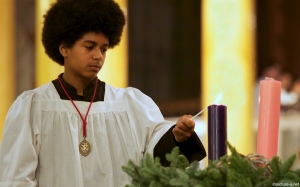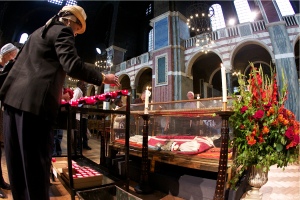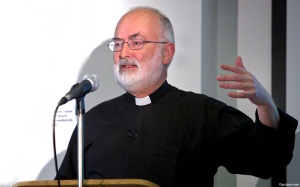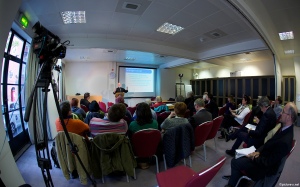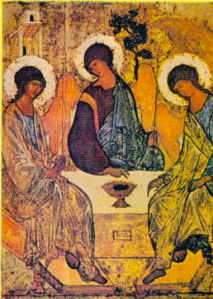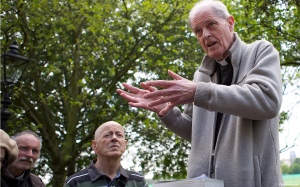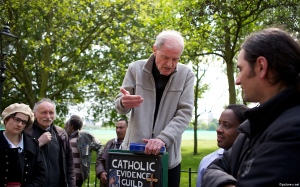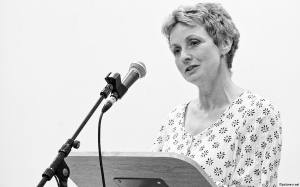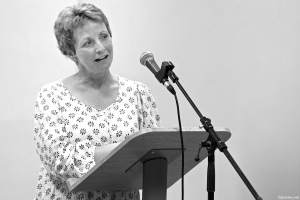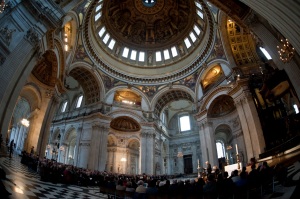
On Thursday April 11, in the first of a three-part series of discussions organised by St Paul’s Institute and sponsored by CCLA, an ethical fund manager, Archbishop Vincent Nichols placed before the audience, challenging views for our society and it’s communities, to consider what sort of City it is that we want that would better serve society. As keynote speaker for the evening, Archbishop Vincent took a view of the City as a place where people live and work. Since it is people who make the City, it follows that the City can therefore be a place of human flourishing. The Archbishop’s talk therefore was entitled ‘ Good People ’.
Quoting TS Eliot who said ‘ there is no life that is not in community….. ’ the Archbishop offered that if one were to take the view of a City as being a community, then we must pursue all that cultivates community. The ancient Greeks he went on to say, had a clear view on the purpose of the city, ‘ the polis ’ as they called it which was to build a good society where citizens thrived as members of a virtuous community. In a city since we are all in it together, the well being and fulfilment of each is in some ways dependent on others. There are ties of trust and solidarity to be recognised and developed between people and institutions which in turn create common bonds. These common bonds and shared common interests could result in good. In recent times though, the apparent legitimisation of the pursuit of self interest which were once believed to result in better outcomes for all had led to breakdowns such as the financial crisis, prompting searching questions about inequalities which have been generated by the approach of self-enrichment. Therefore more collective thought was needed about what can be changed for the good of all. Archbishop Vincent offered as a key to the answer, the concept of
‘Good people bound by good purpose’
Good first had to be defined, itself not an easy process since we no longer share many of the patterns of thought which would help establish its meaning. Instead of applying the conventional rationale of morality and duty he felt it would help to understand ‘desire’ as a vital and fundamental driving force of ethics and goodness. In our quest for relationships of deep friendship and for our lives to have meaning so as to make a contribution, we all have in us a desire for ‘good’. The Archbishop said that respecting others and seeking their good was essential to one’s own good. Seeking the good and responding to its attractiveness further takes us out of narrow, self-centered attitudes. It is he suggested the path to true human flourishing and fulfilment.
However he did recognise that our desire for the good can easily be distorted through selfishness greed, pride or lust. It is a struggle between good and evil that runs in every aspect of our lives. Thus in order to lean to the good we need to learn to pursue virtues that become our moral agents. These would help us do that which is right and honourable irrespective of reward and regardless of what we are obliged to do. The Archbishop then briefly explored the fundamentals of the virtues of prudence, justice, courage and temperance.
Prudence or right reasoned action was the opposite of rashness and carelessness. Courage ensured firmness and the readiness to stand by what we believe in times of difficulty while Justice enabled us to give what was due to others by respecting their rights and fulfilling our duties towards them and the virtue of Temperance which helps us moderate our appetites and use of the world’s created goods was the opposite of consumerism and the uninhibited pursuit of pleasure. These together form essentials of a happy life.
The formation of good people starts in the family which is the first school of citizenship. Loving, stable families are the vital building block of every society. Schools come next and are important in building character, as are universities and in the context of the City, the business schools. Whilst we should look to these institutions of the community to foster virtue and thereby build character, we should also look to the institutions of commerce to nurture and strengthen character. Such institutions should have a clear sense of purpose so as to be enterprises of ‘good purpose’.
When sight of purpose is lost then breakdowns of the system occur. Reflecting on the Francis Review into Staffordshire NHS Trust, Archbishop Vincent quoted the head of the professional standards authority who spoke of leaders having lost sight of their moral purpose. They seemed to have forgotten they exist to do good. Concern for finances had taken priority over care, compassion and respect leading him to say that “unless you know the purpose for which you are running an organisation you will never get the ethics right within it”.
That sense of ‘good purpose’ was not just for the public sector but also for commercial organisations. Mark Carney, the incoming Governor of the Bank of England spoke of the speaking of the need for companies to “define clearly the purpose of their organisations and promote a culture of ethical business”, and, in doing so, for employees to have “a sense of broader purpose, grounded in strong connections to their clients and their communities”. It is not simply a focus on profit as an end in itself but Archbishop Vincent suggested that the true justification of business was when profit was made while making the world a better place. Goods and services produced that truly serve people, create employment, offer fair returns to investors, while minimising harm. Any business looking to remain true to that purpose needed people with technical skills and competencies as well as the required character and virtues he outlined earlier. These “ architects of lasting business success ”in staying true to their virtues would create a culture within their organisations that actually promotes and strengthens good practice.
It should be noted that the exploration of ‘good people bound by good purpose’ comes up against the limits of law and regulation since these mechanisms are slow to react and new rules usually deal with the last problem not the next one. Furthermore a compliance mentality creates perverse incentives while increasing bureaucracy. Rules become a lazy proxy for morality and people think that if what they do is not against a rule, it must be in order. Such a society he counselled, would become inherently fragile. What is required the Archbishop believed was a fundamental transformation of purpose, so that business, and the financial sector is seen by everyone as it should be – at the service of society. Reform though must be credible or as John Kay, an economic commentator says, it will take another financial crisis before the City really wakes up to the scale of reform that is needed.
Archbishop Vincent though is firm in his belief that there is great potential for good in people which far too many employers do not release or encourage because of the primary aim to maximise short term profit. In mitigation, companies tended to justify themselves through additional programmes of social benefit or philanthropy but as the Archbishop insisted, these acts of benevolence should be supplementary to the shared value created by the core work of the business activity. Rather than react to laws and guidelines or engage in these programs, it was far more important for business to have a clear purpose to serve society. To this end, the quality of leadership is critical since all the good influences that support the way for a better society is hugely influenced by these choices made by leaders. The Archbishop drew on Paul Polman’s remarks as CEO of Unilever when he reminded the assembled guests at the launch conference of the Blueprint for Better Business last September that in the long term no business can succeed in a society that fails.
The Christian instinct Archbishop Vincent affirmed, sees the potential for good in a city and gave us all food for thought in noting that the Bible started in a garden and ended in a city. He then drew our attention to the setting of the evening’s lecture that the beauty that is St Paul’s Cathedral invited those of us present to gaze upwards and place our hopes and fears in the context of the Eternal. It also perhaps afforded us recognition of our frailty, our need of one another and our shared destiny. In closing, Archbishop Vincent left us with his impression that humanity had a most extraordinary capacity for good and that he deeply believed that there are many untapped ways by which we could organise the world of work in service of the common good.
There then followed a discussion with the panel consisting of Baroness Helena Kennedy, Tracey McDermott of the FSA, Peter Selby who is the director of St Paul’s Institute. Proceedings were under the chair and direction of Stephanie Flanders, the economics editor of the BBC. Questions were put to Archbishop Vincent from both the panel and audience. Archbishop Vincent’s responses in the video are well worth noting.
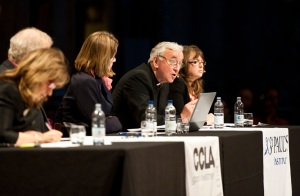
Please click above image for the video
Pictures courtesy of Marcin Mazur/catholicnews.org.uk
